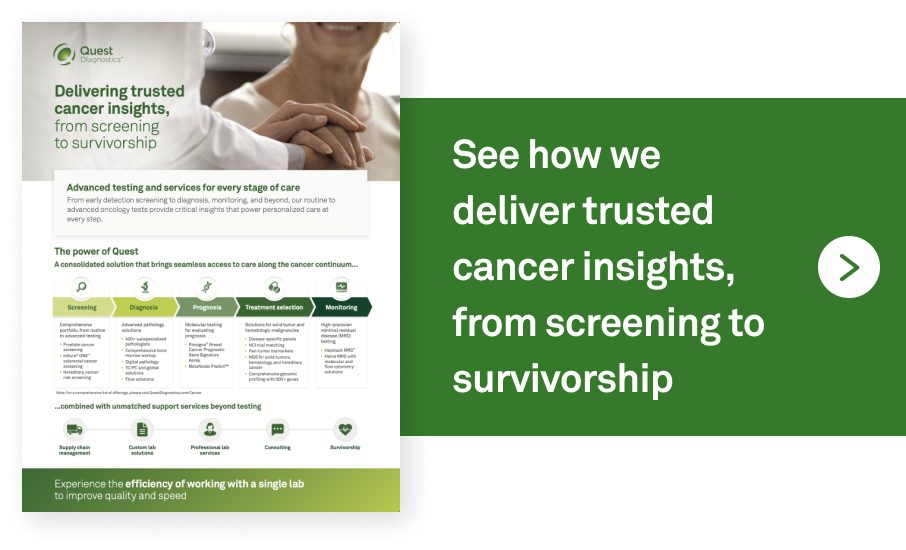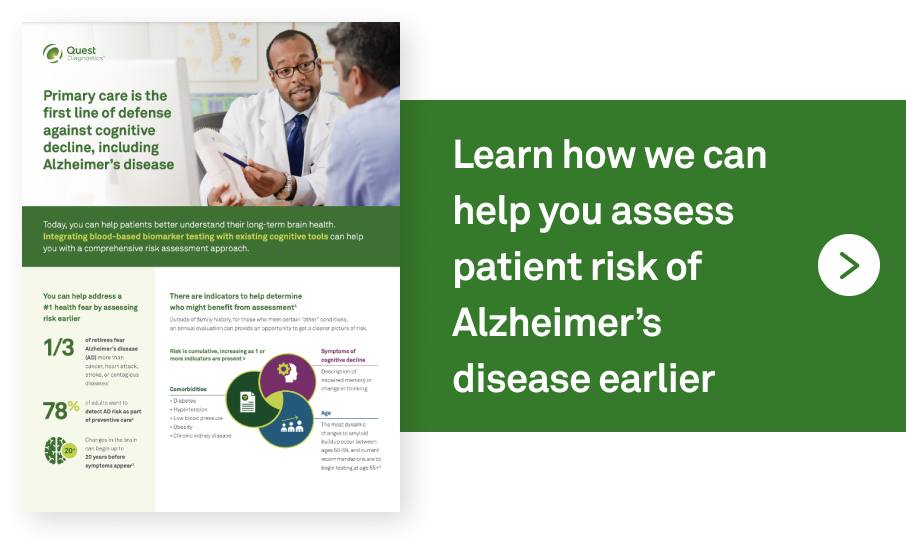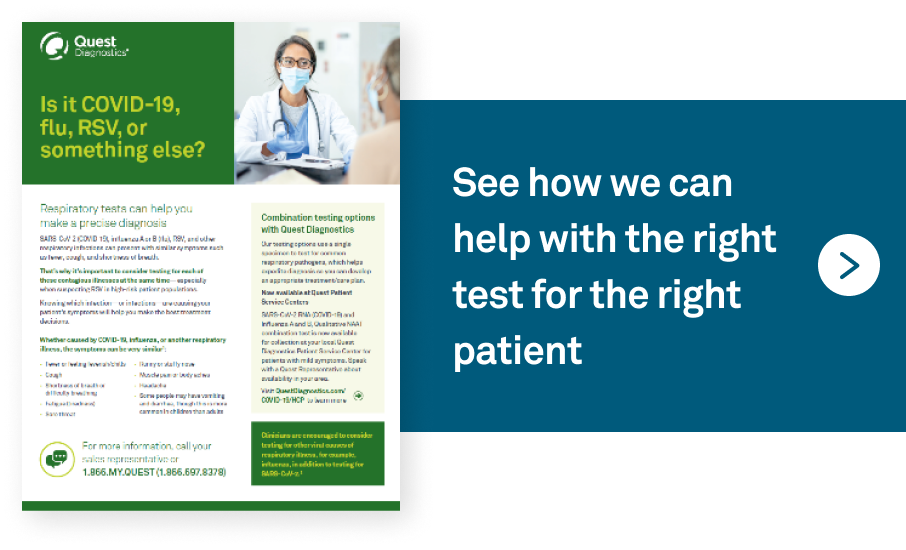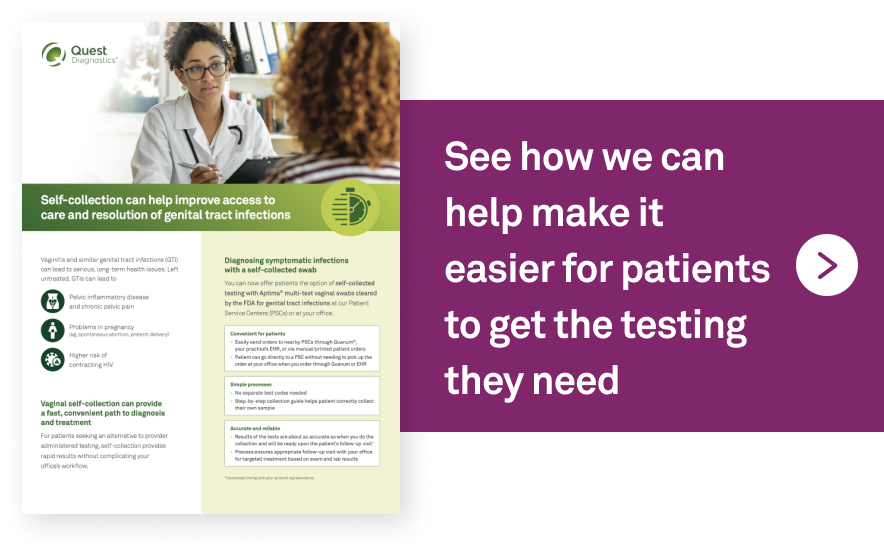October 2024

Discoveries, trends, and discussions in diagnostics
1) Breast Cancer Awareness Month
2) Cancer care starts in primary care
3) Utilizing multiple biomarkers to assess risk of cognitive decline
4) Understanding alternative markers for earlier RA diagnoses
5) Managing food allergies during the holidays
6) Enabling faster treatment with respiratory molecular combination testing
7) Improving access to care of genital tract infections with patient self-collection

|
Breast Cancer Awareness Month |

|
Breast Cancer Awareness Month |

|
Breast Cancer Awareness Month |
Breast Cancer Awareness Month |
Screening can help identify risk earlier
October is Breast Cancer Awareness Month, and we join healthcare providers and leading organizations in highlighting the importance of educating women and men on what they can do to be proactive with their breast health.
Breast cancer mortality rates have been decreasing steadily since 1989, for an overall decline of 42% through 2021. This decrease is believed to be the result of finding breast cancer earlier through screening and increased awareness, as well as better treatments.1



|
Better outcomes |
Better outcomes |
Cancer care starts in primary care
Utilizing multiple biomarkers to assess risk of cognitive decline5,6
Understanding alternative markers for earlier RA diagnoses

|
Better experiences |
Better experiences |
Managing food allergies during the holidays
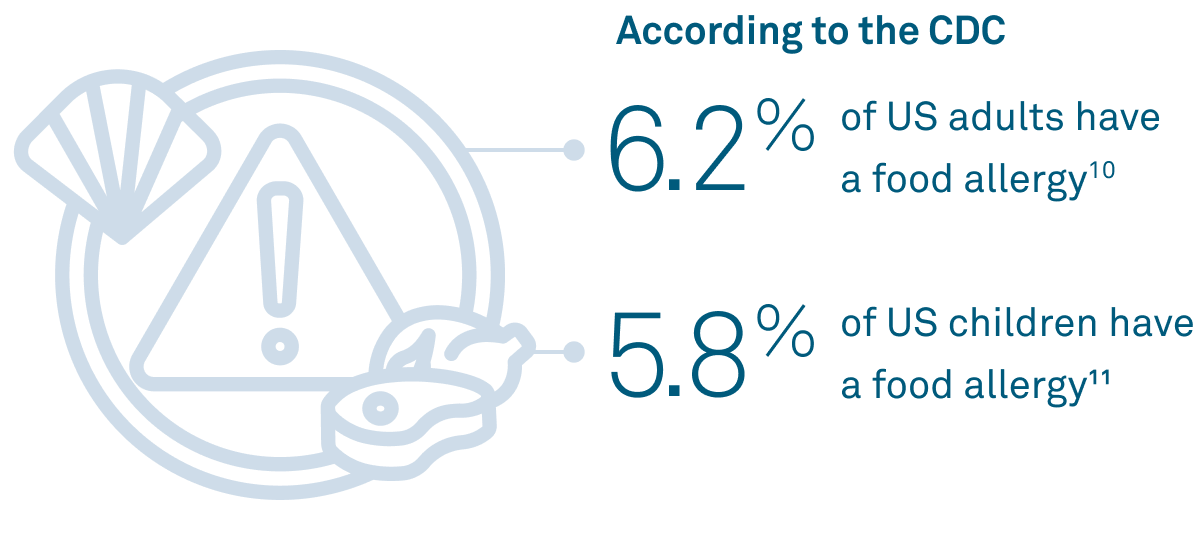
Enabling faster treatment with respiratory molecular combination testing
- Distinguish between COVID-19, influenza A and B, RSV, and other respiratory pathogens with just 1 swab
- Eliminate the need for multiple tests or patient visits—helping to speed up the time to a diagnosis
- Help you determine the appropriate care pathway for your patients

|
Removing traditional barriers to testing |

|
Removing traditional barriers to testing |
Removing traditional barriers to testing |
Improving access to care of genital tract infections with patient self-collection
- Pelvic inflammatory disease and chronic pelvic pain
- Problems in pregnancy (eg, spontaneous abortion, preterm delivery)
- Higher risk of contracting HIV
|
|
Convenient for patients. Easily send orders to nearby PSCs through Quanum®, your practice’s EHR, or via manual/printed patient orders. |
|
|
Simple processes. No separate test codes needed and a step-by-step collection guide helps patients correctly collect their own sample. |
|
|
Reliable quality. Vaginal self-collection provides a similar quality of sample as a healthcare professional would collect.12 And when patients self-collect, results can be ready upon the patient's follow-up visit.* |
Achieving the Quadruple Aim in your practice
About Diagnostics Dialogue
- American Cancer Society. Key statistics for breast cancer. Updated January 17, 2024. Accessed August 15, 2024. https://www.cancer.org/cancer/types/breast-cancer/about/how-common-is-breast-cancer.html
- CDC. Breast cancer statistics. June 13, 2024. Accessed August 13, 2024. https://www.cdc.gov/breast-cancer/statistics/index.html
- Breastcancer.org. Male breast cancer. Updated July 30, 2024. Accessed September 4, 2024. https://www.breastcancer.org/types/male-breast-cancer
- American Cancer Society. Key statistics for breast cancer in men. Updated January 19, 2024. Accessed August 13, 2024. https://www.cancer.org/cancer/types/breast-cancer-in-men/about/key-statistics.html
- Lantero Rodriguez J, Karikari TK, Suárez-Calvet M, et al. Plasma p-tau181 accurately predicts Alzheimer’s disease pathology at least 8 years prior to postmortem and improves the clinical characterisation of cognitive decline. Acta Neuropathol. 2020;140(3):267-278. doi:10.1007/s00401-020-02195-x
- Brickman AM, Manly JJ, Honig LS, et al. Plasma p-tau181, p-tau217, and other blood-based Alzheimer’s disease biomarkers in a multi-ethnic, community study. Alzheimers Dement. 2021;17(8):1353-1364. doi:10.1002/alz.12301
- Hampel H, Hu Y, Cummings J, et al. Blood-based biomarkers for Alzheimer’s disease: Current state and future use in a transformed global healthcare landscape. Neuron. 2023;111(18):2781-2799. doi:10.1016/j.neuron.2023.05.017
- Xu Y, Wu Q. Prevalence trend and disparities in rheumatoid arthritis among US adults, 2005-2018. J Clin Med. 2021;10(15):3289. doi:10.3390/jcm10153289
- Healthline. Rheumatoid arthritis by the numbers: Facts, statistics, and you. Updated July 21, 2021. Accessed August 14, 2024. https://www.healthline.com/health/rheumatoid-arthritis/facts-statistics-infographic
- CDC. Diagnosed allergic conditions in adults: United States, 2021. Accessed August 14, 2024. https://www.cdc.gov/nchs/products/databriefs/db460.htm
- CDC. Diagnosed allergic conditions in children aged 0–17 Years: United States, 2021. Accessed August 14, 2024. https://www.cdc.gov/nchs/products/databriefs/db459.htm
- Ogale YP, Grabowski MK, NabakkaP, et al. The acceptability of self-collected samples for STI testing: a qualitative study among adults in Rakai, Uganda. BMJ Open. 2023;13(11):e073241. doi:10.1136/bmjopen-2023-073241

